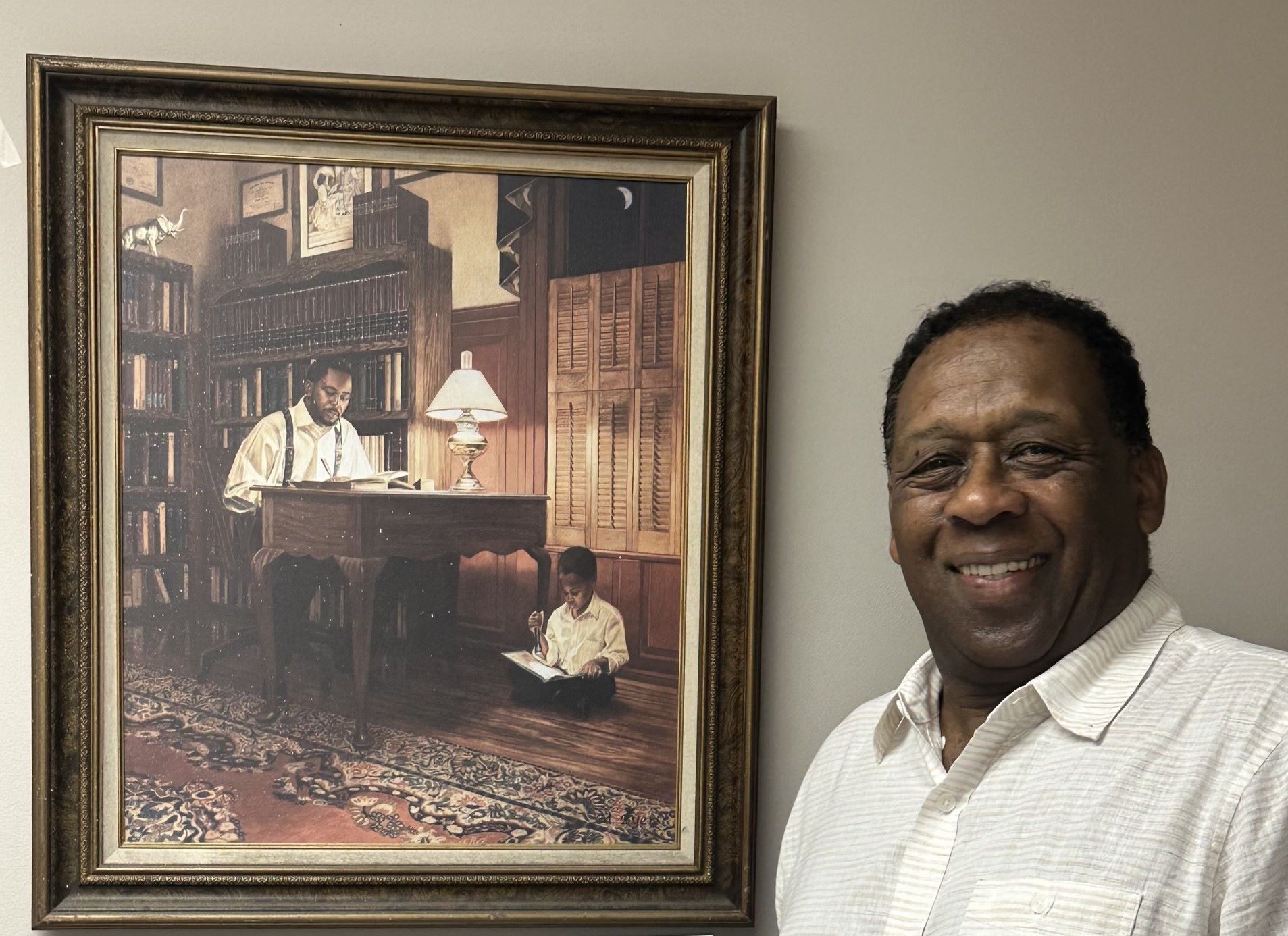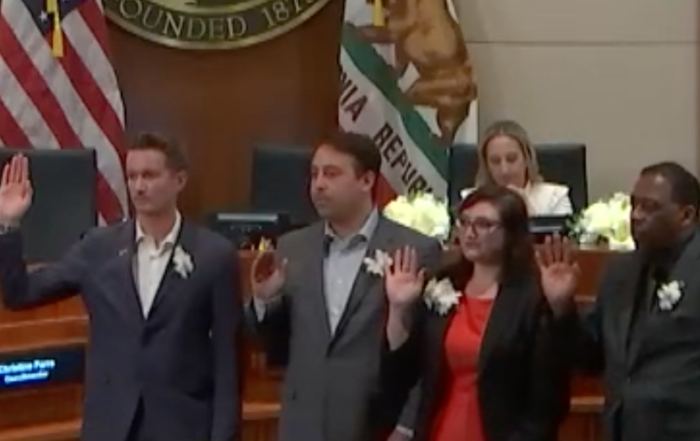On the wall of Barry Snell’s office hangs a painting that depicts a father working at his desk while his son sits below him, reading a book.
“That painting gives me strength,” Snell said. His smile widens as he recalls his childhood days in New Jersey, with a father who emphasized the importance of education and community service. When Snell was in high school, his father was finishing a degree at Rutgers University.
“In our household, we all did our homework together,” he said, gesturing towards the scene in the painting. “My dad had four children, and he was proud to say that all of them finished four years of college, and all of us either got our master’s or did some kind of graduate work and so I have always instilled the values my dad talked about—that education puts everybody in an equal balancing act.”
Snell’s father also passed on a tradition of community service to his family. He volunteered as a tutor, served as a Boy Scout leader, coached local sports, and took his family to volunteer once a month at a local food pantry.
After receiving his Bachelor’s degree in accounting from Morehouse College in Atlanta, a Master’s of Science in taxation from Golden Gate University in Los Angeles, and a CPA from the state of California, Snell continued such civic leadership and educational traditions with his own family. They moved to Santa Monica twenty years ago to access an excellent public school district, and Snell established a successful career as a certified public accountant and small business owner.
His extensive involvement on the Board of Education and the PTA Executive Board led to his appointment to the Santa Monica Community College Trustee Board in 2014 and then his election to that board later in the same year. After being re-elected in 2018 and 2022, he served as Chair of the Trustee Board from 2017-2018 and 2022-2023. In 2020, he was elected to serve a three-year term on the California Community College Board of Trustees and then was re-elected this past November.
“I’m really excited because two years ago, we put out a bond for Santa Monica College because it was in dire need of housing for students, and we were successful with it,” he said. “We’re getting ready to build some student housing on our Bundy campus.”
Out of 116 community colleges in California, only 10 have student housing, and most of them are located in rural areas. Even more staggering, he notes, is that one out of every five community college students is homeless.
“Housing has been a big issue for me, and that’s part of the reason why I put my hat in the ring for city council because I think I’ll be able to really assist with some land use issues,” he said. “How to build affordable housing in Santa Monica —that’s one of my big dreams, to be able to do that.”
Snell welcomes a community discussion about using the city’s public land for affordable housing, highlighting a particular interest in building along transit corridors, in the downtown area, and potentially at the site following the city airport’s closure in 2028.
He draws upon a deep knowledge of Santa Monica, having served on the Santa Monica Pier Board and the Downtown Santa Monica Board, and he also takes issue with various members of the current city council, who tried to change Santa Monica’s rent control laws in 2022.
“I’m a major supporter of rent control, of keeping seniors in their home, and of keeping rent reasonable for tenants,” he said. “There was an eleventh-hour stipulation to try to change some of the rent control laws. Thank God it failed … and any initiative that comes up to try to reverse any kind of rent control ordinances will be something that I will strongly advocate against.”
As for public safety issues and the homelessness crisis, Snell draws upon his background as a CPA on forensic accounts to promote an innovative approach.
“I’m a firm believer that we cannot solve the homeless crisis by criminalizing it,” he said, encouraging county and state partners to create resources and provide services for those who are homeless, mentally unstable, or using drugs.
For example, his conservatorship work for the County of Los Angeles has shown him a model for working closely with financially distressed clients, who have access to a variety of helpful resources, including an attorney and a healthcare professional.
“This is the same kind of concept that we need to advocate at our state and our county level, where we really build up policies and laws to be able to provide services for those individuals on the street and for those individuals who can’t take care of themselves, to put them into a conservator-type situation until such time as the court and the professional individual dealing with them says that this individual can maintain and take care of themselves,” he said.
He is particularly concerned that no location on the Westside could house someone having a mental breakdown or a drug-induced crisis, noting that the closest beds are in Torrance. Rather than pushing homeless individuals from one location to another in what he terms a “stalemate” situation, he desires to work with city partners to build a facility where paramedics and police officers can transport individuals to receive needed services.
A similar approach is taken by the nonprofit Santa Monica Black Empowerment Association (SMBEA), which Snell helped found four years ago at the height of the pandemic and social unrest. He currently serves as the Chairman of the Board.
“We have provided a safe area,” he said, noting that SMBEA’s services are open to anyone, regardless of ethnicity. “We’re almost like a catalyst. We are the bridge between all the different support services for individuals in need in Santa Monica, and we are that facilitator, where we direct, where we fill out applications for individuals, for jobs, applications for housing, direct them to our city housing czar, and then we also are able to provide food stamps and all those other kinds of services that the county provides.”
As the conversation draws to a close, Snell provides a historical perspective for the timing of his bid for city council.
“I just feel that this time is a time for someone like myself, with the experience, with the passion, with the understanding of our community, and how to deal with public finance, that it’s time to have a black male on the city council,” he said. “The last time there was a black male on city council was 47 years ago. That’s a long, long time for a community that says that they’re very diverse and very progressive … and it’s hard to raise money, it’s hard to take your time out to do the work, so there’s not a whole lot of opportunities for anybody, no matter what your background is, to be able to serve like this. And I just feel fortunate that I have the opportunity to do it.”
Photo courtesy of Barry Snell.
Stay informed. Sign up for The Westside Voice Newsletter
By clicking submit, you agree to share your email address with Westside Voice. We do not sell or share your information with anyone.








